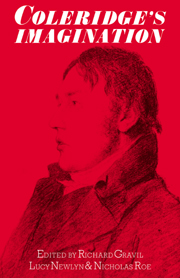Book contents
- Frontmatter
- Contents
- Pete Laver: a memoir
- Abbreviations
- Introduction
- Romantic imagination, nature and the pastoral ideal
- ‘The infinite I AM’: Coleridge and the Ascent of being
- Struggling with the contingent: self-conscious imagination in Coleridge's notebooks
- Coleridge's rejection of nature and the natural man
- The imagination of Mrs Samuel Taylor Coleridge: unknown inspiration of an unknown tongue
- ‘As much diversity as the heart that trembles’: Coleridge's notes on the lakeland fells
- ‘Leaping and lingering’: Coleridge's lyrical ballads
- ‘Radical Difference’: Coleridge and Wordsworth, 1802
- Imagining Wordsworth: 1797–1807–1817
- The Otway connection
- Imagining Robespierre
- Coleridge's Dejection: imagination, joy and the power of love
- Imagining naming shaping: stanza VI of Dejection: an Ode
- Mythopoesis: the unity of Christabel
- The languages of Kubla Khan
- Notes on the contributors
- Index
The Otway connection
Published online by Cambridge University Press: 04 August 2010
- Frontmatter
- Contents
- Pete Laver: a memoir
- Abbreviations
- Introduction
- Romantic imagination, nature and the pastoral ideal
- ‘The infinite I AM’: Coleridge and the Ascent of being
- Struggling with the contingent: self-conscious imagination in Coleridge's notebooks
- Coleridge's rejection of nature and the natural man
- The imagination of Mrs Samuel Taylor Coleridge: unknown inspiration of an unknown tongue
- ‘As much diversity as the heart that trembles’: Coleridge's notes on the lakeland fells
- ‘Leaping and lingering’: Coleridge's lyrical ballads
- ‘Radical Difference’: Coleridge and Wordsworth, 1802
- Imagining Wordsworth: 1797–1807–1817
- The Otway connection
- Imagining Robespierre
- Coleridge's Dejection: imagination, joy and the power of love
- Imagining naming shaping: stanza VI of Dejection: an Ode
- Mythopoesis: the unity of Christabel
- The languages of Kubla Khan
- Notes on the contributors
- Index
Summary
When in his final version of Dejection: an Ode (in Sibylline Leaves, 1817) Coleridge wrote ‘As Otway's self had framed the tender lay’ (line 120) replacing the language of earlier versions (‘Edmund's self’ or ‘William's self’ or ‘thou thyself’, i.e. Sotheby!), he may have been making a substitution that ‘disturbs every knowledgeable reader’, as George Dekker believes (Coleridge and the Literature of Sensibility, p. 238). He may, on the other hand, have been inscribing a code reference to a precursor poem lying behind the whole symbiotic family of ‘Intimations’ and ‘Dejection’ odes by his dear friend Wordsworth and himself, the earliest surviving member being The Mad Monk of 1800.
In its immediate context, in Coleridge's verse letter to Sara dated ‘April 4, 1802, Sunday Evening’, that portion of the ‘lay’ being recited by the wind as a ‘Mad Lutanist’ on a wind-harp is a tale of the moaning and screaming of a lost child, quite plausibly compared to Wordsworth's ballad of Lucy Gray – as it often is – although strictly Lucy Gray is never heard to moan or scream but is only said to sing ‘a solitary song / That whistles in the wind’. Indeed Reeve Parker in Coleridge's Meditative Art (Ithaca, 1975, pp. 97–200) by associating the lost child with the ‘groans and shudderings’ of the preceding lines helps us recognize allusions to the female vagrant's tale in Wordsworth's Adventures on Salisbury Plain (and to Milton's fallen angels and routed pagan deities).
- Type
- Chapter
- Information
- Coleridge's ImaginationEssays in Memory of Pete Laver, pp. 143 - 160Publisher: Cambridge University PressPrint publication year: 1985



